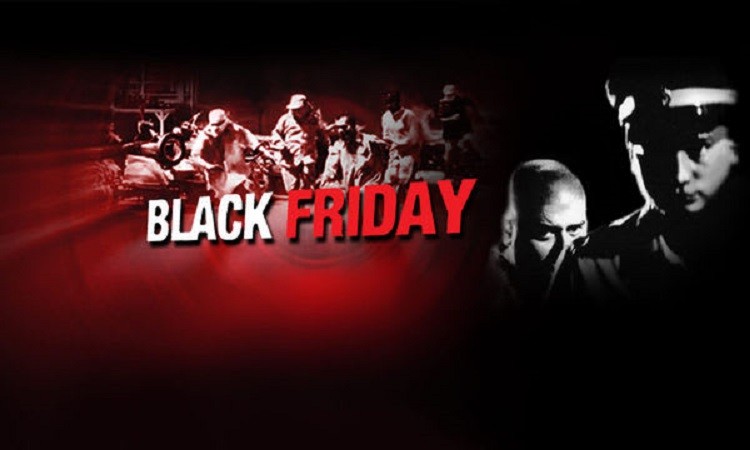
The non-fiction film "Black Friday," directed by Anurag Kashyap and based on the work by S. Hussain Zaidi, is one of the most lauded and divisive works in Indian cinematic history. The film investigates the circumstances leading up to the 1993 Bombay bombings, a tragic episode in the history of the nation. The turbulent path "Black Friday" took to the big screen, however, only adds to the story's intrigue. The movie's off-screen story is just as compelling as its on-screen narrative, despite being banned in India and released in theaters two years later than expected.
The 1993 Bombay bombings were a string of planned terrorist attacks that took place in Mumbai (then known as Bombay), resulting in extensive damage and fatalities. The incident is still regarded as one of India's most significant terrorist acts. The 2002 release of S. Hussain Zaidi's book "Black Friday" offered a thorough and accurate account of the circumstances leading up to the bombings and the subsequent investigations.
Anurag Kashyap, the director, recognized the opportunity to transform this compelling story into a stirring and thought-provoking movie that would clarify the complexities of the case and the characters involved.
Production on "Black Friday" began in 2004 with a 2005 release date in mind. The movie encountered censorship and legal challenges as it dug deeper into the tragic and painful events of 1993.
Due to the sensitive subject matter of the movie, the Central Board of Film Certification (CBFC), which is in charge of certifying movies for release in India, expressed worries that the movie might incite violence or disturb public order. As a result, "Black Friday" had to fight the censor board for a while.
The film's producers, Arindam Mitra and Arindam Nandy, and director Anurag Kashyap were committed to upholding the film's authenticity and refused to make any significant changes. The film was outlawed in India as a result of the conflict between the directors and the censor board.
The film's release was further delayed as a result of the "Black Friday" ban and subsequent legal disputes. The filmmakers filed a lawsuit on their behalf, claiming that the film was a realistic and fair depiction of the events and that the right to creative expression should not be restricted.
"Black Friday" attracted worldwide attention during this tumultuous time and was shown at a number of film festivals, including the Locarno Film Festival in Switzerland. It was well-received by critics, which raised audience interest.
When the Indian Supreme Court decided to end the film's release ban on "Black Friday" in 2007, that was the tipping point. The importance of the movie as a historical record and a representation of actual events was acknowledged by the court. However, it stipulated that a disclaimer be included in the movie stating that it did not condone or support any violent acts.
Finally, nearly two years after its original scheduled release date, "Black Friday" had its theatrical debut in India in February 2007. The film received praise from critics for its realistic storytelling, standout performances, and unflinching depiction of a tragic period in Indian history.
The impact of "Black Friday" on Indian cinema is immeasurable. Its delayed release and legal disputes brought to light the challenges India faces with regard to censorship and artistic freedom. The movie's commercial success also paved the way for Bollywood to tell stories that are more socially conscious and realistic.
The film's director, Anurag Kashyap, went on to become one of the most renowned and influential filmmakers in the business, well-known for pushing the limits of Indian cinema. The cast of the movie, which included Kay Kay Menon, Aditya Srivastava, and Pavan Malhotra, won a lot of praise for their work, establishing their reputations as reputable actors in the business.
In addition to being a significant cinematic accomplishment, "Black Friday" is also a testament to the perseverance of writers and directors who are dedicated to telling stories that subvert expectations and reveal uncomfortable truths. Its transformation from a forbidding movie to a well-received release serves as a reminder that art, even when it deals with distressing subjects, has the ability to elicit thought, spur conversation, and bring about change.
"Black Friday" continues to be praised for its fearless storytelling and unwavering dedication to authenticity as a significant period in Indian cinema history. It serves as a sobering reminder that while censorship may cause a movie's release to be delayed, it is powerless to stop the lasting effects of storytelling that captures the uncomfortable truths of our world.
Bollywood Actor Sharib Hashmi in Aneek Chaudhuri's upcoming Hindi film on AI
7 Minutes of Cinematic Brilliance: 'Black Friday's' Remarkable Chase Scene
The Library Scene in 'Sanam Teri Kasam' and Its Alleged Inspiration